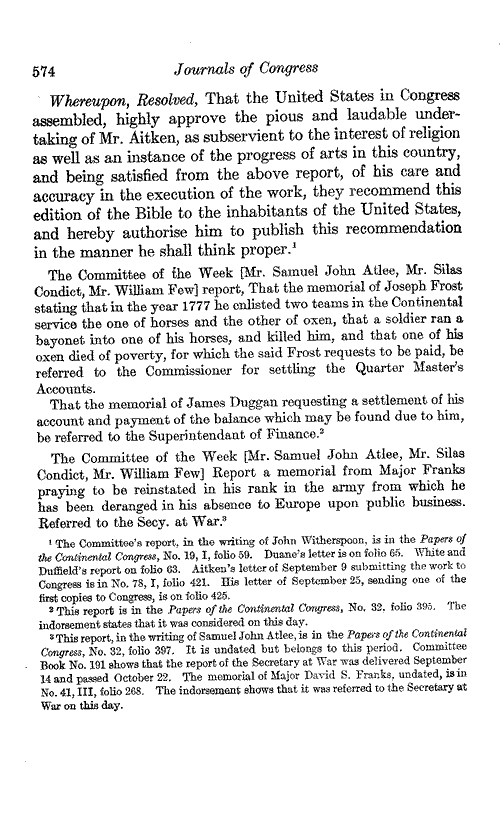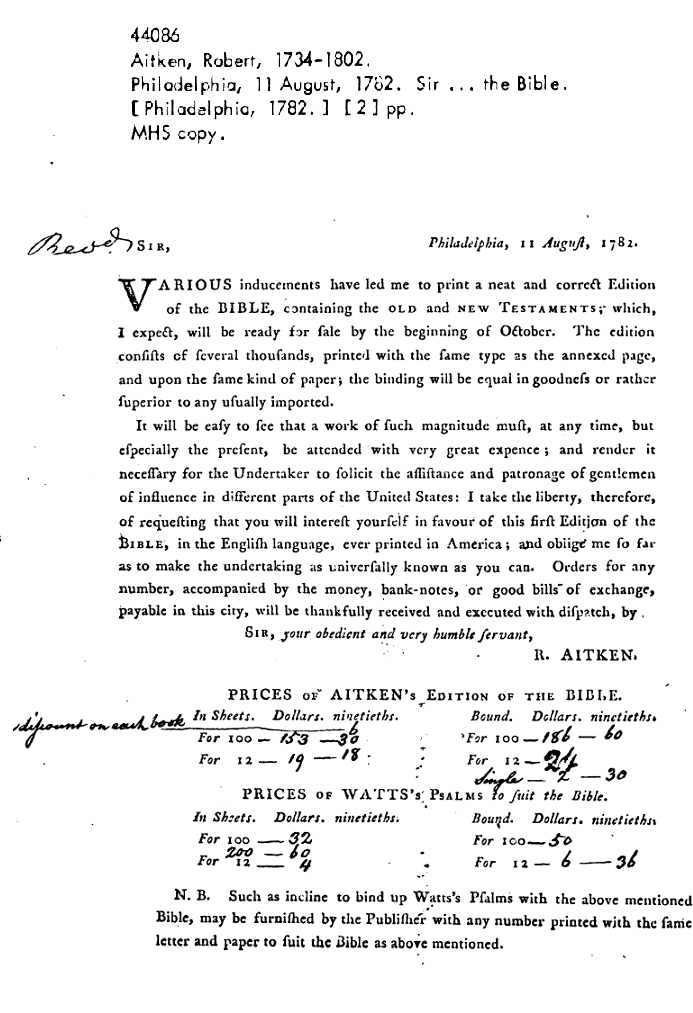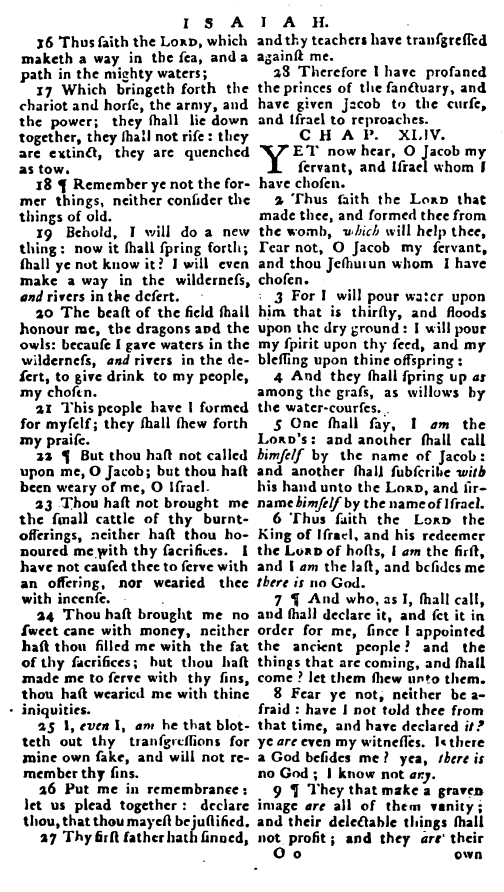In addition to faulty theology, there are several glaring historical errors in Glenn Beck’s talk to Fellowship Church on July 5. Sadly, the audience is less knowledgeable now than before he spoke. Here is one example.
Glenn Beck told Fellowship Church that the first thing Congress did after the United States won the Revolutionary War was to print a Bible in English. Watch:
[youtube]http://youtu.be/cBgkSUILZEw[/youtube]
Transcript:
Don’t let anybody tell you we are not a Christian nation because we absolutely are a Christian nation. This is one of seven Bibles, three or four of them are held by the Smithsonian. Three are in private hands; extraordinarily rare. It’s called the Aitken Bible. This was the first thing Congress did when they started. We couldn’t print the Bible. So when we first established ourselves and we won the war, the first act was to print the Aitken Bible. When it was given to George Washington, he wept, and he said, ‘finally, a gift that is meaningful enough to give to the men that served by my side.’ We are a Christian nation. And we need to start behaving like a Christian nation, with love and respect, and take the beam out of our own eye before looking at the speck in someone’s else’s. We’re losing memberships in our churches because, stop talking about the things that the Bible tells us to do. Let’s start doing them!
It is ironic that Beck tells the audience to start doing what the Bible says just after he consistently bore false witness about the Aitken Bible.
Let me take Beck’s claims bit by bit.
It’s called the Aitken Bible. This was the first thing Congress did when they started. We couldn’t print the Bible. So when we first established ourselves and we won the war, the first act was to print the Aitken Bible.
Beck was holding up a copy of what appeared to be the Aitken Bible. It is rare and valuable. It is also true that the British prohibited Bibles printed in America. However, nothing he said after that is true. Congress did not print the Bible and the involvement with Aitken’s project was not initiated by Congress. Furthermore, the timing of Aitken’s request and Congressional response do not match Beck’s passionate claim. It most certainly is not the first thing Congress did after the United States won the war for independence.
Robert Aitken petitioned Congress in a letter dated January 21, 1781. He wanted the approval of Congress for a Bible he was printing and he wanted to be the official Bible printer of the United States. You can read his petition here and here. I have it below as well.
To the Honourable The Congress of the United States of America
The Memorial of Robert Aitken of the City of Philadelphia Printer
Humbly Sheweth
That in every well regulated Government in Christendom The Sacred Books of the Old and New Testament, commonly called the Holy Bible, are printed and published under the Authority of the Sovereign Powers, in order to prevent the fatal confusion that would arise, and the alarming Injuries the Christian Faith might suffer from the spurious and erroneous Editions of Divine Revelation. That your Memorialist has no doubt but this work is an Object worthy the attention of the Congress of the United States of America, who will not neglect spiritual security, while they are virtuously contending for temporal blessings.
Under this persuasion, your Memorialist begs leave to inform your Honours That he hath begun and made considerable progress in a neat Edition of the Holy Scriptures for the use of schools, But being cautious of suffering his copy of the Bible to Issue forth without the sanction of Congress, Humbly prays that your Honors would take this important matter into serious consideration & would be pleased to appoint one Member or Members of your Honourable Body to inspect his work so that the same may be published under the Authority of Congress. And further, your Memorialist prays, that he may be commissioned or otherwise appointed & Authorized to print and vend Editions of the Sacred Scriptures, in such manner and form as may best suit the wants and demands of the good people of these States, provided the same be in all things perfectly consonant to the Scriptures as heretofore Established and received amongst us, And as in Duty bound your Memorialist shall ever pray
Robt. Aitken Philadelphia. 21, Jany. 1781.
Aitken appeared to be under the impression that the United States might operate like Britain and regulate the authorized version of the Bible. He wanted his Bible to be the one approved by the government. In addition, he wanted Congressional awareness and approval because it had been illegal to do what he was doing under British rule. In fact, the war had not yet been won when Aitken began his work. He had already printed the New Testament but wanted to finish the job. “Being cautious of suffering his copy of the Bible to Issue forth without the sanction of Congress,” Aitken didn’t want to do anything which Congress might oppose.
Cornwallis surrendered to the American forces on October 19, 1781 so Aitken’s petition came prior to the end of the war, not first thing after we won. Congress appointed a committee to interact with Aitken as he progressed on his project. Aitken sent a copy of his Bible to Congress on September 9, 1782. The Congressional proclamation about the Bible was dated September 12, 1782. . The treaty of Paris formally ending the war did not come until September 3, 1783. The proclamation from Congress is below in the first paragraph:

There is nothing in this proclamation about Congress as Bible printer. Congress clearly recognized Aitken as the author and recommended his work for religious and artistic achievement. It was Aitken’s idea, his work, his investment, and eventually his loss. He didn’t make money on the project, and because Congress didn’t fund the project, he offered the Bibles to George Washington with the suggestion, made by a friend, that Washington ask Congress to purchase Bibles for the troops who had fought in the war.
Beck embellished the story more by involving Washington. Beck claimed:
When it was given to George Washington, he wept, and he said, ‘finally, a gift that is meaningful enough to give to the men that served by my side.’
There is no record that Washington wept when Aitken’s friend, John Rodgers, requested that Washington asked Congress to buy copies of the Bible for his troops. Washington declined politely saying that most of the troops had gone home and so he couldn’t make such a request. Washington’s return letter on the subject indicated that he would liked to have given the troops a Bible but not in the manner claimed by Beck. Here is what Washington replied to Aitken’s friend, Rev. Rodgers.
Your proposition concerning Mr. Aikin’s Bibles would have been particularly noted by me, had it been suggested in season, but the late Resolution of Congress for discharging part of the Army, taking off near two thirds of our numbers, it is now too late to make the attempt. It would have pleased me well, if Congress had been pleased to make such an important present to the brave fellows, who have done so much for the security of their Country’s rights and establishment.
Beck’s quote from Washington is quite a dramatic embellishment as is most of what he had to say to Fellowship Church. Beck’s story about Congress and the Aitken Bible is false; his citation about Washington is highly inflated and misleading. Most people listening would go away thinking that the first thing Congress did after winning the war for independence was to use public funds to print a Bible and give it to the American troops with the heartfelt approval of George Washington.
Beck’s key story used to support the claim that the U.S. is a Christian nation turns out to be a fabrication.
Beck has to know this. It has been pointed out publicly by numerous writers. Even if somehow he has avoided reading the many debunkings of this story, the alternative isn’t much better. He is either knows the story is a fiction or he is a very, very bad historian. Fellowship Church’s spokesman told Christian Post that Beck was “unmatched” in his knowledge of history. If that is so, then Beck misled Fellowship Church on July 5 with knowledge aforethought.
If Glenn Beck and Ed Young want to honor the passionate plea Beck made to Fellowship Church to stop talking about the things the Bible says to do and to start doing them, then they need to come clean to the congregation and set the facts straight.
For more on the Aitken Bible lie and the involvement of Washington, see this Huffington Post article by Chris Rodda.

 At some point, I hope someone else will ask Beck and Barton why they mislead their audiences with this story. In his Osborne Baptist speech, he says why he does it (listen to Barton near the end of the clip). He wants public policy to change to be in line with his preferences that public school children learn the Bible. He apparently thinks that twisting the Aitken Bible story helps his cause. As I have asserted before, I believe this
At some point, I hope someone else will ask Beck and Barton why they mislead their audiences with this story. In his Osborne Baptist speech, he says why he does it (listen to Barton near the end of the clip). He wants public policy to change to be in line with his preferences that public school children learn the Bible. He apparently thinks that twisting the Aitken Bible story helps his cause. As I have asserted before, I believe this 
